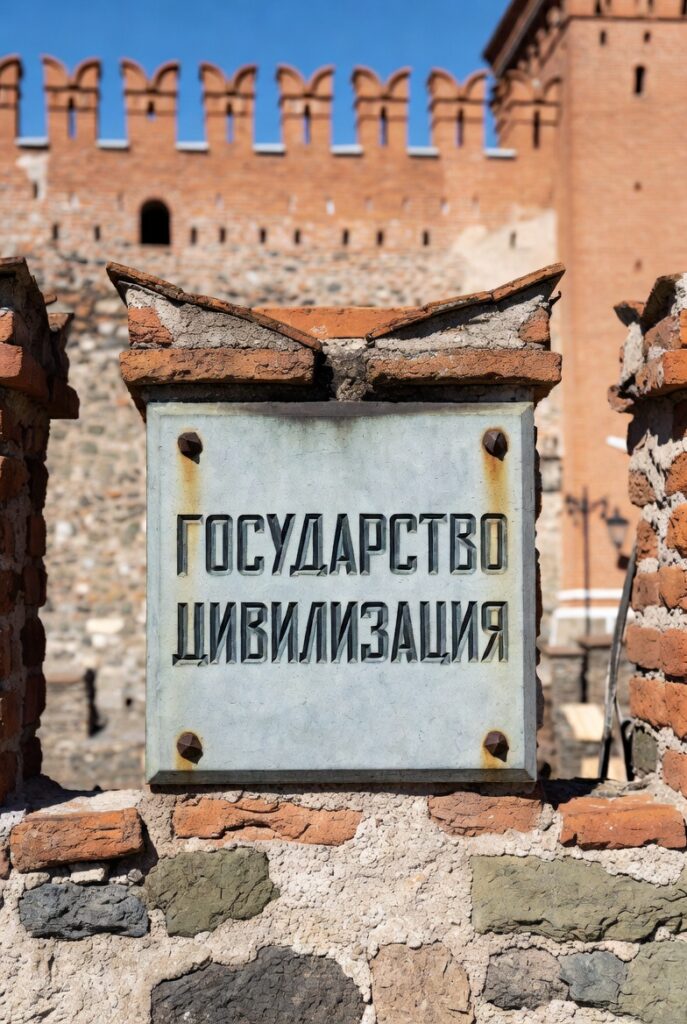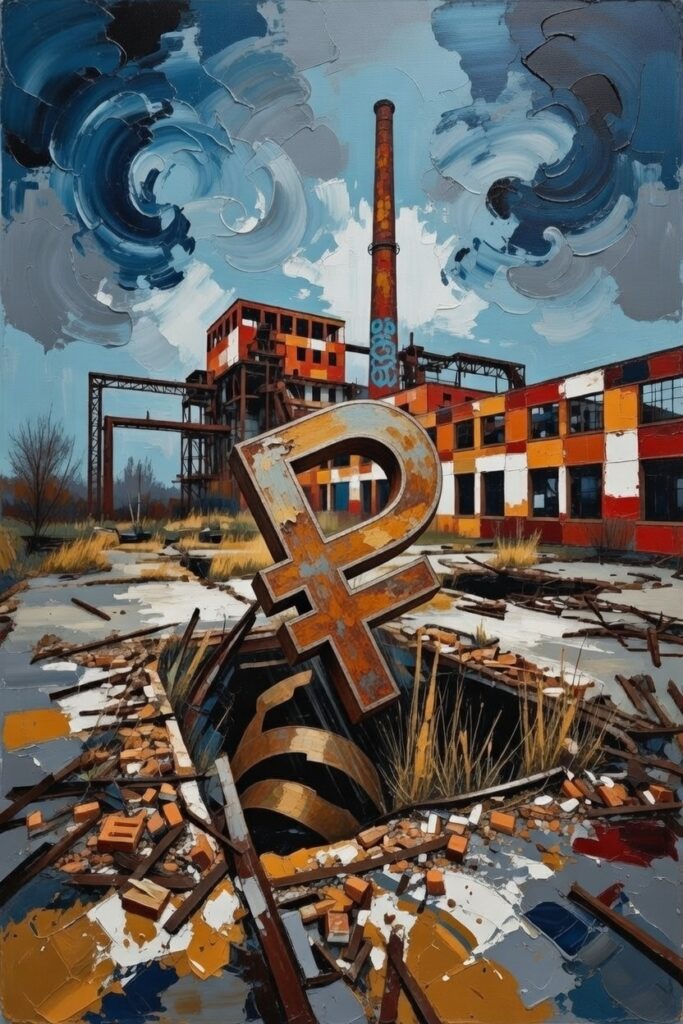Vladimir Putin delivered his traditional speech at the annual Valdai Forum. On this platform, the Russian president presents his current views and directives to an expert audience (though, since the start of the full-scale war, only Kremlin-friendly political scientists come listen to him). Putin once again spoke about the formation of a «multipolar world» and expressed regret over the collapse of the Soviet Union. However, this year the president offered a new perspective on the reasons for the USSR’s dissolution. Previously, he blamed it on the erroneous policies of the Communist Party, but now he claims that the Union was destroyed by some «Russian leadership» that sought to improve relations with the West. According to him, this leadership made a mistake, as the West did not reciprocate towards the new states.
Putin has long been trying to overcome the «consequences of the greatest catastrophe» by creating various blocs and «unions» with post-Soviet countries, and now by directly occupying territories of neighboring Ukraine. Seemingly, these actions are acquiring a new ideological underpinning: if the previous «leaders» made the mistake of destroying the Union, then the new leaders can correct that mistake. Putin no longer mentions the natural causes of the USSR’s collapse.
The Russian president once again «winked» at Donald Trump, despite criticism coming from the American president (Trump called Russia a «paper tiger,» but Putin still believes he can establish working relations with the U.S. leader). At the same time, he clearly stated his intention to continue the war in Ukraine and hinted that he is not afraid of the war with the West. Russian army is occupying territories of the neighboring state, and this process, in turn, occupies Putin himself. The president devoted a significant part of his speech to the advancement of Russian troops. The audience learned about the existence of settlements like Yunakovka, Volchansk, Konstantinovka, and other towns and villages. Putin is clearly immersed in studying military maps of the advance and is ready to discuss Ukrainian villages, forgetting in the process about the problems of multipolarity and the new world order. Thus, the Russian president is restoring the USSR that, allegedly, Russia’s past leadership buried.
External Overseer for the North-West
Vladimir Putin appointed Tver Region Governor Igor Rudenya as his plenipotentiary representative in the North-Western Federal District. This post became vacant after the previous envoy, Alexander Gutsan, was appointed Prosecutor General. It was assumed that the position would be taken by former Deputy Head of the Presidential Administration Dmitry Kozak, who lost his powers as the Kremlin’s curator of post-Soviet space following a bureaucratic attack by Sergei Kiriyenko.
The position of presidential envoy, except for the one in the Far East, has long lost its former significance. However, the post in the Northwestern Federal District stands out from the general background. Politicians who have held it often advanced to higher positions, gaining influential roles: Alexander Gutsan became Prosecutor General, Alexander Beglov and Valentina Matviyenko headed St. Petersburg, and Vladimir Bulavin led the Federal Customs Service. The special status of the position is likely related to the fact that the envoy in the Northwestern Federal District is considered an «overseer» for St. Petersburg—the hometown of Vladimir Putin and his closest entourage. Moreover, St. Petersburg and Leningrad Region are among Russia’s economically developed and thus attractive regions. Nevertheless, Dmitry Kozak decided to forgo the consolation prize: even taking into account all the features, the role of Putin’s representative in the North-West was incomparable in influence to his previous positions.
Kozak’s refusal, seemingly, caused personnel confusion in the Presidential Administration. It was impossible to appoint a completely random person to the envoy position. In addition, influential St. Petersburg clans from Putin’s inner circle (the Kovalchuks, Rotenbergs) have always taken a special interest in posts in their homeland and sought to lobby for the appointment of their protégés. For example, among the possible candidates from the Kovalchuk brothers, their longtime associate Lyubov Sovershaeva was discussed; she currently works as deputy envoy for policy.
In the end, Putin appointed Igor Rudenya as envoy, who is not connected to either the Northwestern Federal District or St. Petersburg. Rudenya, who began his career in the Soviet era in the Ministry of Internal Affairs, later worked in the agricultural sector: he headed Roszerno, served as Deputy Minister of Agriculture, and was even considered a contender for the minister’s post. Since 2011, he has led the Tver Region, serving as governor for nearly 15 years. His name has periodically been mentioned in the context of possible federal appointments. The ex-governor and new envoy is considered a person close to the owners of Transmashholding, Andrey Bokarev and Iskander Makhmudov—that is, people who are also not connected to the St. Petersburg elite. In some sense, the appointment of Igor Rudenya appears to be a compromise decision for Putin, one that had to be made to avoid too overt clan confrontations over the right to have their own «overseer.» That is why the district received an external leader unconnected to local elites.
For the relatively young Rudenya by the standards of Russia’s power vertical (he is 58 years old), the envoy position in the «special» district seems attractive at first glance. The long-sitting regional official has moved to the federal level and may well continue the tradition of predecessors who advanced upward. However, the St. Petersburg elites—the Kovalchuks, Rotenbergs, and St. Petersburg Governor Alexander Beglov—will likely try to test the new «overseer» for resilience.
St. Petersburg has always been a field of political conflicts. Governors feuded with Vyacheslav Makarov, who held the post of speaker of the legislative assembly and led United Russia. Clans could oppose the city head. The envoy, by the nature of his duties, will have to get involved in these hidden or open conflicts, especially around issues like nominating candidates for the State Duma, which will inevitably lead to the emergence of ill-wishers. Rudenya lacks experience in political intrigue, so getting involved in it could seriously harm him.
The promotion of Rudenya’s candidacy may indicate the ambitions of his patrons—the oligarchs Andrey Bokarev and Iskander Makhmudov—who are interested in expanding business in the Northwestern Federal District. This will likely cause discontent among representatives of the «old» St. Petersburg elite.
Crackdown on Yabloko
Security forces arrested Deputy Chairman of the Yabloko Party Maxim Krutikov, accusing him of spreading so-called «fakes about the army.» Several months ago, another deputy chairman of the party—the popular Pskov politician Lev Shlosberg—was arrested. The book of former deputy of the St. Petersburg legislative assembly Boris Vishnevsky—another prominent representative of the party—was recognized as extremist material. Ahead of the 2026 State Duma elections, Russian authorities are intensifying pressure on the only party that, albeit cautiously, opposes the war in Ukraine.
Yabloko’s campaigns usually run under the slogan «For Peace and Freedom.» At the same time, the sentiments of Russians—war fatigue and a desire to start peace talks—clearly diverge from Putin’s intention to continue the war. By the time of the vote, this divergence will likely become even more noticeable. Therefore, people may simply support the slogan «for peace”—just as, for example, five years ago, the New People party entered the State Duma solely thanks to its name, which responded to the demand for novelty in politics.
Yabloko is exempt from collecting signatures for registration in the federal parliament elections, as the party has factions in the legislative assemblies of Karelia, Pskov Region, and St. Petersburg. This means that the presidential administration cannot cut the party at this filter. Therefore, the authorities are seeking to paralyze the party through forceful attacks, and in the long term, they may even try to deprive it of registration before the State Duma elections.










